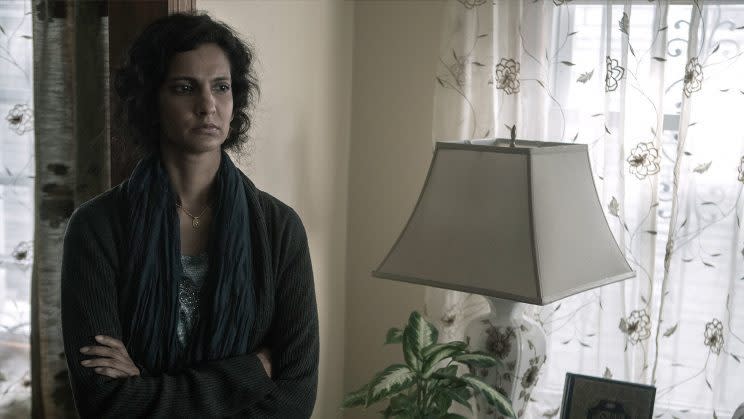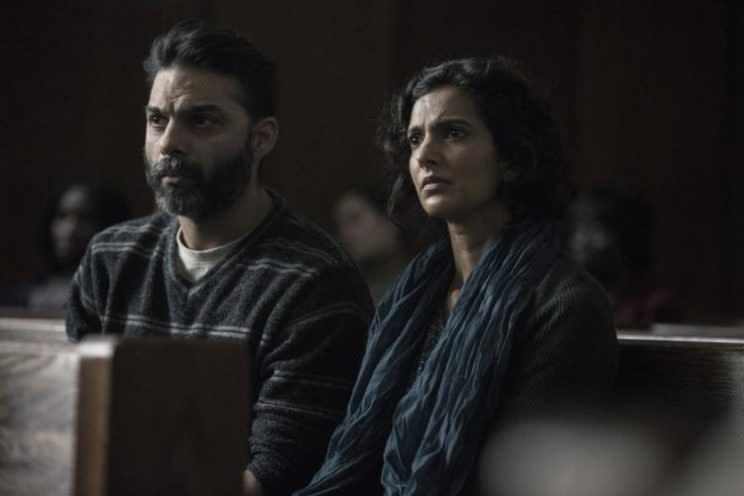‘The Night Of’ Postmortem: Poorna Jagannathan Talks About the Twist Coming With Naz’s Mom

Warning: This interview contains storyline and character spoilers for The Night Of.
Part of the reason you’re so convinced Naz can’t possibly be guilty on The Night Of: those nice parents of his. Could the child of the kind Safar and Salim Khan possibly have committed such a vicious act?
But we’re halfway through the season with Sunday’s “The Art of War” episode, and now the twists and turns of the murder case begin to really kick in. Poorna Jagannathan, the theater and indie film star and producer who plays the quietly haunting Safar, talked to Yahoo TV about why the show has become this summer’s TV obsession, how the cultural issues the Khan family is facing resonate with her personally, and what she thinks the ultimate takeaway of the series will be.
Jagannathan, whose performance as Safar has drawn Twitter praise from Amy Schumer, also hints at an upcoming twist for Naz’s mom, one that could add another layer of heartbreak to the Khan family’s mounting woes.
How do you describe The Night Of when people ask you why viewers are so obsessed with it?
In terms of story, it’s a murder mystery. At first look, it feels like a murder mystery, but the minute you get in to it. I often describe it as… when people are eating their food so quickly, you go quickly from one bite to the next. But The Night Of, it’s a chocolate velvet cake and you have to take a bite, and you have to chew it, and you have to just be with it, and enjoy the texture, then put your fork back in and take another slow bite. People are calling it a slow burn, and I completely I understand that term. What I love about The Night Of, it’s actually not about the night of… it’s about what happened from the night of that makes it so interesting.
I know a lot of people are like, “Oh, my God, how could Naz be so dumb?” But I remember my 20s. That was a common night in my 20s, where you just said, “Oh, OK,” to one small, wrong thing, and then you could be done. What does it look like when you’re down a rabbit hole?
Related: Catch Up on ‘The Night Of’ With Our Recaps
And we see he’s naïve, sheltered, he’s very close to his parents. It is a big deal for him to even take his father’s car without permission. That tells you he’s not someone who has this kind of experience all the time.
That’s right. It’s deeply relatable. You can so quickly, as a viewer, put yourself in his shoes. The horror, it’s not only… there is an element of the cinematography even that elicits dread, coupled with the fact that you could see yourself in the situation so easily. I find that, even though I know how it goes, I often find myself talking to Naz on the TV, “Don’t do that! No, no, no, don’t do that!” That happens because you’re walking next to him versus watching him.

It is a crime story, but it’s also very much a family story, a story about cultural differences, about being thrown into the legal system. What aspect of it drew you most to the project when you first read the script?
I think the complexity of a crime is very rarely explored. We’re fed a diet of, I guess it’s called procedurals, but… I was listening to Serial while we had already shot a bit of this, and what was so striking about Serial is how the crime affects every aspect of a person’s being. The stuff that they touch, and the stuff that they don’t even know that they touch. The reverberations of the crime are so deep seated. What I love about the script is it shows, or attempts to shows, different aspects of that. Of course, what drew me to the character… one of my favorite parts of this whole process was acting with Peyman Moaadi, who plays my husband… [he] is an actor that I take the most admiration for in the world. That was such a joyful part of the process.
Also the journey that the mother goes through is very, very, relatable, heartbreaking, because she does cross to the other side of going from believing [Naz], to, as the evidence to mounts, doubting his innocence. I have a son. The decision of a mother to go to the other side and give up that belief that he’s innocent, it’s such a heartbreaking place to be in. Again, as a mom, I know every decision your son makes, a child makes, is a deep reflection of you. To see that reflection, to actually look at that reflection, and know that it’s the possible reflection of a killer is horrifying. The journey that [Safar] goes through was an intensely, intensely, heartbreaking one for me.
Does this story seem, unfortunately in some ways, especially relevant right now, in the current political and cultural climate?
It’s amazing. This project had been delayed so many times, there was the risk of it not getting picked up at all. It feels very cosmic that it comes at a particular time in our history. I hate to say it couldn’t have come at a better time, and that’s not actually what I want to say… it comes at a time where all the scenes resonate on a completely different level.
Politically, you’ve seen some of the backlash that [Naz and his family] face not only from the non-Muslim community, but from people within the community, which is very rarely spoken about. Of course Naz is being seen as the criminal, of the crime he is accused of, but obviously through a very, Muslim lens, and that is brought up over in the first episode where he’s asked, “Did you leave your guns at home?” It surrounds us, that level of… that level of otherness surrounds all of us all the time. I don’t go a day without noticing it in rhetoric, or in real interactions. I remember after the San Bernardino killings, my husband and I were out together. I was so aware that we were a brown couple, and … were people thinking of us, or digesting us, differently? We’re in a very particular cultural climate, which we all deeply feel, and we carry. And of course, it’s a huge examination of the criminal justice system right now. We’re looking and looking… we’re in deep introspection. The pot is being stirred, and the show enters in to that cauldron.
Do you think the series, then, something this deep and wide in scope, focusing on this family that is just trying to live a good life, like any other family, has the power to help open some minds?
Yes. To see the story on screen is remarkable, and a story made that is relatable to that exactly. Naz, his parents, and the situation, is so humanized. There is a dehumanization that’s happening of Muslims, a one dimensionality that’s happening. When you add this particular narrative, it helps it humanize it, I think, perhaps. Muslim Americans haven’t always been portrayed in a way that feels like there’s flesh to the bones. I am floating from one spirit type to another, that’s my job as an actor. You have Steve Zaillian and Richard Price team up and do that [as writers]. I think that will go a long way. Hopefully it will open the door for many more stories like that.

There is incredible chemistry between you, Riz Ahmed, and Peyman, which again draws us to this family. You tweeted that you’ve been watching the episodes with Peyman as they air. You have lived with this project for so long… was there a little extra time to bond into this on-screen family?
Yes, yes, it was very different for all of us. This project felt very different. We really saw each other grow within it. We became friends when we’re not shooting. Peyman and Riz… we really developed a very, very, strong familial bond. I remember the scene where [Safar and Salim] went to visit Naz in prison, when we went into the room. It was an electric room… one of those amazing moments in this business where all the barriers collapse and you’re completely there. All of us, it was very emotional. The project was very emotional. It felt very personal. It felt very important. We really leaned on each other through out the process.
What is it like watching the finished story unfold now? In this week’s episode, for instance, Naz finally makes it to court and tells his story, and it goes very differently than probably anyone guessed it would.
Oh my goodness. You know what I was really shocked by? The cinematography. There’s a saturation that’s happened, which obviously has come in post-production. We were not part of so much of that story. In last Sunday’s episode, there was a shot when [director] Steve [Zaillian] is literally concentrating on a puddle of water. Do you remember that? It’s when cinematography becomes another character in the story. It’s the difference between looking at a film, or TV, and looking at art. There’s a difference in the eye, of what the eye does. You’re not only looking at the story, looking at the craft somehow, but not an intellectual way… in a very emotional way, you’re experiencing it. Stuff like that, I had no idea that was happening. I had no idea he was shooting in a particular way. Of course, now it makes sense. His direction makes so much more sense now. Back then, he didn’t… he wants you to give the simplest performance. For someone like me, with a character who didn’t have many lines, I was always so afraid I wasn’t [giving] enough. I was always so afraid that it wasn’t enough. That process of communicating with Steve and going back and forth, and only a little later on during the episodes, trusting, just trusting that… it was a real battle for me.

Without giving too much away, what would say about the way the story unfolds for the rest of the season?
In respect of what the ending is, I think The Night Of is about the fact that once you’ve entered into the criminal justice system, it’s very clear that there are no winners. Irrespective of whether you’re acquitted or not, there’s something that has happened that’s irreversible. There’s a loss that happens that’s irreversible. At some point along the series, you understand what the real cost is, what the real fallout is. I do think the last episode reinforces that more than anything else.
Has The Night Of made you want to tackle another intense, great storytelling TV series?
One hundred percent. I am hook, line, and sinker for TV, for what’s happening in certain places like HBO, Netflix, Amazon, Hulu. I’m so eager to be a part of this new wave of TV. I just saw The Americans, and Transparent, and I thought, “Oh, my God.” Talk about shows that make things relatable. The acting, and the female characters… so much richer. Yes, of course, I’m ready.
The Night Of airs Sundays at 9 p.m. on HBO.


